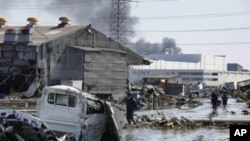As Japan continued to assess the damage from a major earthquake and tsunami on Monday, Cambodian officials and development workers considered the implications here, where Japan is a major donor.
Speaking at a graduate ceremony at the Royal University of Law and Economics, Prime Minister Hun Sen said the Japanese government was set to sign a large aid package on Tuesday. But he warned that the devastation from the disaster could have knock-on effects for Cambodian development.
“The destruction in Japan was the largest, and it will affect the Japanese economy, as well as Japan’s international obligations and implementation [of projects] overseas, including us,” he said.
The severe earthquake and subsequent tsunami hit Japan’s northeast coast on Friday, leveling entire villages and likely killing many thousands, though the official death toll and economic damage is so far unknown.
However, Japanese Ambassador Massafumi Kuroki told reporters at the Japanese Embassy on Monday that aid would continue, including a $94 million package he will sign Tuesday.
The grant aid will go toward flood protection, water distribution systems and demining activities, underscoring the reliance of many groups on Japanese aid across many sectors.
In the period between 1992 and 2009, Japan was the country’s single largest donor country, providing more than 18 percent of overseas development aid, or about $1.83 billion, according to government figures.
“We’re thinking about the earthquake that hit Japan and the following tsunami,” said Yong Saing Koma, president of the Cambodian Center for the Study and Development of Agriculture, which has $800,000 in Japanese funding for 2011 and 2012. “We’re worried that it can hurt or stop or suspend Japanese aid to these projects.”
Chheam Chan Sophorn, chief of the Battambang provincial department for agriculture, said he worried about the possibility of losing Japanese aid that promotes rice production across nine districts.
“We cannot predict what will happen to the upcoming Japanese aid for Cambodia,” he said. “But I have my own worries. It can badly impact our project.”
Him Sophal, chief of the Prey Veng provincial department of education, said the province had at least three projects funded by $150,000 in Japanese development funds to provide study centers and build schools.
He had seen footage as the massive tsunami swept the coast of Japan, he said.
“I just saw the event of the biggest wave, the tsunami,” he said. “I’m very worried because our donor met with a serious earthquake and tsunami. So I’m very worried we won’t reach our goal.”




